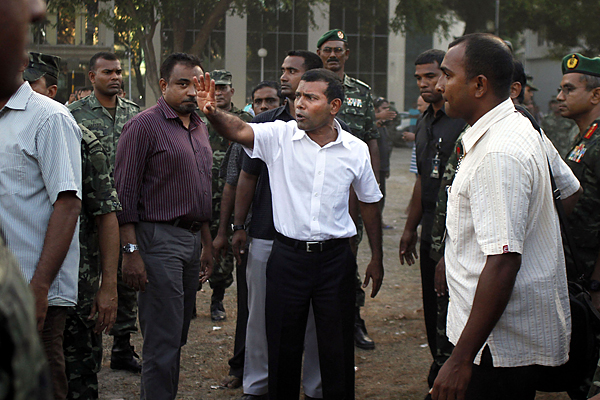Maldives police officers throw tear gas canisters during a clash with the military in Male, Maldives, Feb. 7, 2012. The first democratically elected president Mohamed Nasheed of Maldives resigned Tuesday after police joined the protesters and then clashed with soldiers amid protests over his controversial arrest of a top judge.
Mohamed Nasheed, President of the Maldives until he was compelled to step down today, spent six years as a political prisoner in the 1990s. He was kept for spells in solitary confinement, tortured and beaten by an autocratic regime that ruled over this idyllic archipelago nation for three decades. His victory in the country’s first free and fair democratic elections in 2008 was hailed by some as a lesson for Muslim democracies elsewhere, a peaceful precursor to the Arab Spring. “We have a blueprint here in the Maldives,” Nasheed told me shortly after being sworn in as President. “You don’t need to bomb a Muslim country for regime change.”
Nasheed’s exit, though, came with the country poised on a proverbial knife edge. According to reports, protesters calling for his departure were joined by mutinying factions within the Maldivian police and army. Security forces and demonstrators clashed in the narrow streets of the country’s congested capital Male, a two-acre concrete jungle home to a third of the country’s 400,000 people — and far removed, at least in spirit, from the gorgeous white-sand atolls that make the Maldives one of the world’s most popular and exclusive tourist destinations.
(READ: TIME’s interview with former President Mohamed Nasheed in 2009.)
Faced with what appeared to be an armed uprising, Nasheed made a televised address explaining why he was stepping down: “I resign because I am not a person who wishes to rule with the use of power. I believe that if the government were to remain in power it would require the use force which would harm many citizens.” His Vice-President Waheed Hassan was sworn in shortly thereafter.
It appears that the upheaval has been inspired in part by those still loyal to former President Maumoon Abdul Gayoom, who held power in the country for thirty years through sham elections and a strict, repressive police state. Police defectors, possibly part of a squad once loyal to Gayoom, apparently assaulted the party headquarters of Nasheed’s Maldivian Democratic Party on Monday night. Aides close to Nasheed have dubbed the uprising a “coup by the former regime.” But Hassan’s spokesman told reporters that it “was not a coup at all. It was the wish of the people.”
Though he crested into the Presidency on a surge of democratic optimism, Nasheed has faced months of political paralysis, sparring with opposition parties, including Gayoom’s DRP, as well as Islamists in the country’s fledgling parliament. Economic reforms that Nasheed argued were necessary to compensate for the yawning deficit left behind by Gayoom proved unpopular with the public. Most recently, tensions centered around the Nasheed government’s arrest and detention of a prominent judge, accused of “political bias” and corruption. Figures within Nasheed’s administration itself as well as the U.N. Human Rights Commission denounced the move. Weeks of protests followed, culminating in the dramatic events of the past few days.

Sinan Hussain / AP
(READ: President Mohamed Nasheed, a TIME Hero of the Environment, 2009.)
For Nasheed, it is a sad fall from grace. An erudite, soft-spoken former human rights campaigner, he and his activist colleagues slowly chipped away at Gayoom’s rule while in exile in Europe and Sri Lanka, fomenting peaceful anti-Gayoom protests in 2005 and 2006 that forced the archipelago’s strongman to cave to international pressure and allow truly competitive elections. A political ally of Nasheed’s likened the effect of his victory over Gayoom in subsequent polls “as if, in the same country, both Saddam Hussein was toppled and the Berlin Wall fell.”
Nasheed has made international headlines mostly as a prizefighter in the struggle against climate change. The Maldives, precariously perched an inch above sea level, may sink entirely beneath the Indian Ocean before the end of the century, according to some estimates. In 2009, Nasheed held a cabinet meeting underwater to dramatize the imminent threat his country and other low-lying archipelago states elsewhere face. He voiced the sensational idea that the world would soon need to help his entire nation find a new place to live, and advocated the creation of a sovereign wealth fund to purchase territory in India or Australia. “At the end of the day, we’re talking about needing dry land. It is a myth to assume that humanity has always been stationed in the same place,” he told TIME shortly after assuming the presidency. This was all agit-prop to get the world to pay attention. The Island President, a documentary about his climate change activism, has won awards in international film festivals.
Now, with some reports claiming Nasheed is being detained by army mutineers, it’s unclear what more change he can affect. Sitting in his presidential palace in 2009, he described to me his ordeal in Gayoom’s island prisons. “Few have been tortured, or brutalized, as much as I have,” he said. “Establishing real democracy here will be the greatest justice of all.” That’s a path from which those succeeding Nasheed must not stray.

